|

Granite Kitchen Countertops:
|
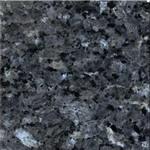
|

|
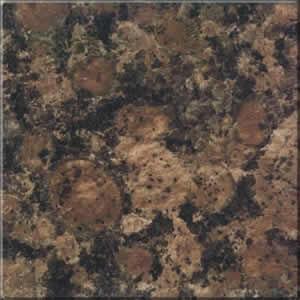
|

|
Blue Pearl
108"*26"*2CM
100% Natural Granite
Blue and Sparkle
Polished and Ready to Install
Lifetime Warranty
|
Black Galaxy
108"*26"*2CM
Material: 100% Natural Granite
Black and Golden Sparkle
Polished and Ready to Install
Lifetime Warranty
|
Baltic Brown
108"*26"*2CM
100% Natural Granite
Brown
Polished and Ready to Install
Lifetime Warranty
|
Absolute Black
108"*26"*2CM
100% Natural Granite
Black
Polished and Ready to Install
Lifetime Warranty
|
|
|
Material Handling
Slabs: Handling slabs is more complicated.
When the pieces are large and heavy, slabs should be loaded and unloaded with the
proper equipment, a forklift with boom or an overhead crane. If the marble or granite
has a polished face, the slabs should be loaded vertically with the polished faces
touching each other.
|
|
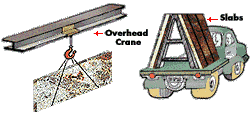
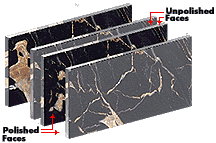
At the job site, the slabs must be carried in a vertical position.

|
Storage
When slabs are going to be stocked at the job site, the
following precautions should be taken:
- Slabs should be placed away from the job traffic area.
- The polished sides should be facing each other.
- Slabs should be resting vertically.
- If it is necessary to stack them, the slabs should be separated by a 1"x4" piece
of wood.
|
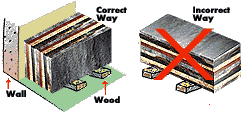
|
Steps involved in a countertop installation
- Sketch the countertops allowing for overhang on top of the cabinets. Include backsplashes
and any cutout dimension. In addition, choose a finished edge for any visible edge
of the countertop and backsplash. (See Edge table below). When sketching the countertops,
take into account that the size availability of the slabs is approximately 102"
x 62". Therefore, location of the seams is an important consideration.
- With a sketch and material alternative, contact a few stone fabricators and ask
them for a quote and delivery time. The quote should include prices for templates,
fabrication, and installation.
- Fabrication shops will require approximately 50% deposit to start the job. Before
giving any payment, the customer should approve the material. When inspecting the
material, one should consider variation, small imperfections in the stone, and particular
markings on slabs. If there are concerns regarding the stone, the customer should
try to see the actual stone to be used for their project. The customer should also
know that stone is a natural material, so it has unique characteristics that cannot
be changed.
- Fabricators or installers will fabricate templates. In order to be able to make
accurate templates, cabinets should already be installed and fixed. Accessories
such as sinks, cook tops, faucets, dishwasher screws, and any other related hardware
should be purchased and at the job site location prior to beginning templates.
- Fabricators will cut the stone and finish the edges as per order. Any changes may
result in extra charges. Good seams and edges are an important consideration when
looking at the craftsmanship and quality of a project. If the stone is going to
be installed already polished, all the edges of the tiles should be beveled to allow
the installer a small margin of error during the installation.
|
|
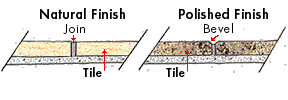
|
Care of stone
|
|
In order to keep your in perfect condition, it should be kept clean. The most common
way to maintain stone is to brush away dust. Stone should be washed with a clean,
soft cloth and fresh water. A mild detergent can be used periodically to remove
any residue that remains ingrained. These steps will save many problems with stone.
Some stone suppliers recommend applying a sealer on the stone a few weeks after
installation is completed. This helps prevent staining on the stone. The sealer
should be reapplied periodically since it wears off after an extended period of
time.
|